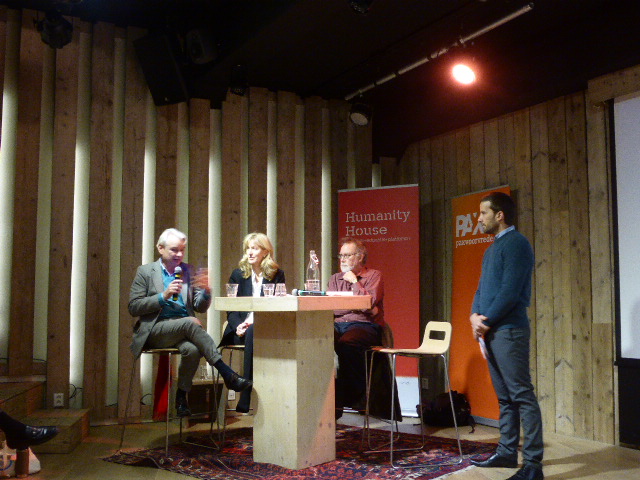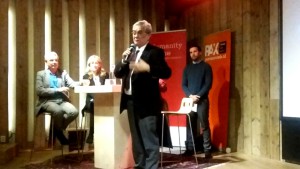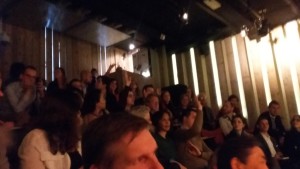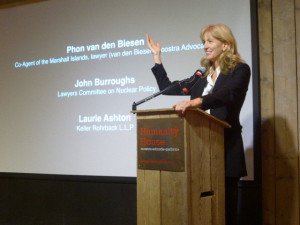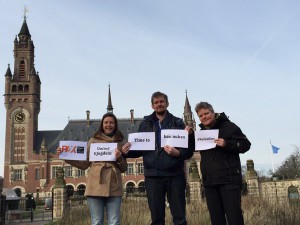“When the explosion occurred, there were many people, including children, who were a far distance from the bomb, on our atolls which, according to leading scientists and assurances, were predicted to be entirely safe. In reality, within 5 hours of the explosion, it began to rain radioactive fallout at Rongelap. Within hours, the atoll was covered with a fine, white, powdered-like substance. No one knew it was radioactive fallout. The children thought it was snow. And the children played in the snow. And they ate it.”
On March 7, 2016, Tony de Brum, former Foreign Minister and co-agent of the Marshall Islands, opened the ICJ oral arguments by describing his personal experience as a witness to many of the 67 US nuclear tests that were conducted in the Marshall Islands. The same Tony de Brum spoke this weekend about the Marshall Islands Nuclear Zero Lawsuits at an event co-sponsored by PAX, Nuclear Age Peace Foundation, SGI and IALANA at Humanity House in The Hague.
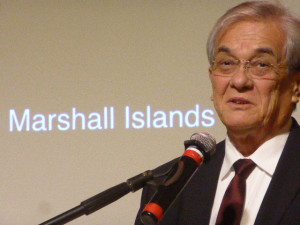 Humanitarian impact nuclear weapons
Humanitarian impact nuclear weapons
The Marshall Islands are paying a heavy price for other countries’ nuclear weapons. In the period of 1946-1958, the Republic was the location for almost 70 US nuclear tests that exposed inhabitants to such high level of radiation that the effects are still being felt today. The tests included the largest nuclear device ever detonated by the US, in a 1954 operation known as Castle Bravo. The bomb, dropped on Bikini Atoll, was three times more powerful than expected and a thousand times larger that the Hiroshima bomb.
In front of a full stage at Humanity House De Brum explains how the Marshallese are still confronted with the impact of the US nuclear tests: even in 2016, people from the Marshall Islands are facing long-term contaminated environments and food sources, aborted foetuses and birth defects.
Legal arguments for nuclear zero
After the personal story of Tony de Brum, members of the legal team went on stage. Phon van den Biesen clarified the lawsuits and hearing procedures, the ICJ Advisory Opinion of 1996 and NPT Article 6 (Each of the Parties to the Treaty undertakes to pursue negotiations in good faith on effective measures relating to cessation of the nuclear arms race at an early date and to nuclear disarmament, and on a treaty on general and complete disarmament), arguing that more needs to be done to require all signatories to actually conclude a disarmament treaty. Van den Biesen: “Twenty years ago the ICJ unanimously said: negotiate disarmament. They haven’t. So we’re back.”
John Burroughs (Lawyers Committee on Nuclear Policy) elaborated on cases against India and Pakistan, who are not part of the NPT. The case against India, that started on Monday 7 March, took place on the same day that media reports said that the Indian military test-fired its nuclear-capable K-4 submarine-launched ballistic missile.
One hand clapping
Laurie Ashton (Keller Rohrback L.L.P.) explained legal story of the UK case and their peculiar “one hand clapping” argument: the UK expressed dismay that the Marshall Islands are bringing a case against the UK while the other nuclear-armed members of the NPT (China, France, Russia and the US) do not accept the jurisdiction of the ICJ. A ruling against the UK could therefore force the them to “be the one hand clapping” for good faith nuclear disarmament negotiations among the five nuclear-armed NPT signatories. Laurie Ashton illustrated by one single movement how she and the rest of the legal team felt when they heard UK’s one hand clapping argument.
“We speak human language, so join us in Court!”
Wednesday (March 16) marks the final preliminary hearing of the Nuclear Zero cases. All speakers made it very clear that showing support helps. It really makes a difference, for lawyers too, to know that there are people watching the ICJ hearings who support the Nuclear Zero message. As Tony de Brum said in his final remarks: “We thank you for your support. We, together, have to make states comply with their legal obligations to pursue negotiations for a world free of nuclear weapons”.
The preliminary ICJ hearings against India, Pakistan and the UK will end this week. After that, the legal team will have to wait for the jurisdiction of the ICJ, which can take months. To stay updated on the Marshall Islands Nuclear Zero lawsuits follow www.nonukes.nl, nuclearzero.org or follow #NuclearZero on social media.
More information
- You can follow the ICJ hearing live on public stage on Wednesday, March 16, 10.00h-11.30 (India), 15.00h-16.30h (UK). Be there!. Don’t forget to bring your passport and make sure you arrive at Peace Palace at least 30 minutes before the hearing. You can also follow the ICJ hearing online: www.icj-cij.org.
- Here you can find the daily ICJ updates from NAPF.
- Click here to see the video of the Humanity House event made by Casper van der Zijde. Together with PAX, Casper joined the official Hiroshima Peace Memorial Ceremony marking the 70th anniversary of the city’s bombing on August 6, 1945.

